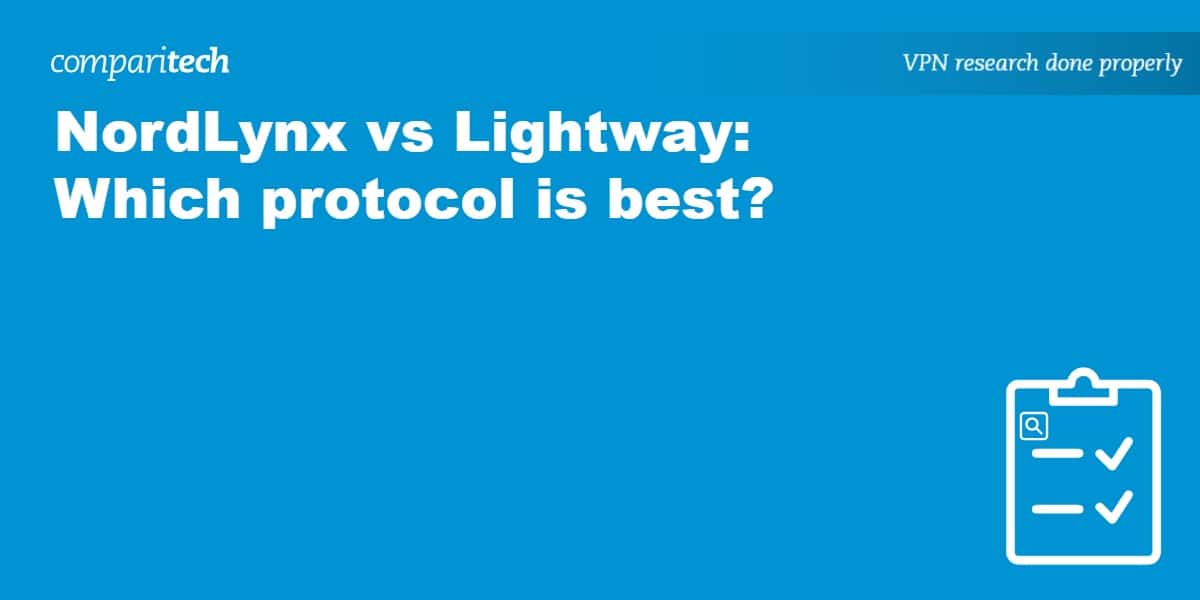Chances are you’ve heard of NordVPN and ExpressVPN which are two of the biggest VPN services available. The two established VPN providers have plenty in common including large server networks, fast connection speeds, and comprehensive security and privacy features. However, one key difference is that while NordVPN uses NordLynx, a protocol built on the popular WireGuard protocol, ExpressVPN uses a different proprietary protocol called Lightway.
In this post, we’ll take a close look at both NordLynx and Lightway and how they compare and contrast. This will include speed, security, their ability to go undetected (and bypass censorship), and their level of support. We’ll attempt to determine which protocol is best so you can more quickly and easily reach a decision as to which VPN protocol best fits your needs.
NordLynx and Lightway history
ExpressVPN launched in 2009 while NordVPN was introduced just three years later in 2012. However, both of their proprietary protocols launched in spring 2020. NordVPN saw enough benefits in the new WireGuard protocol that had been introduced just a few years earlier in 2015. Despite admiring its speed and lightweight design, NordVPN wanted a VPN protocol that would better protect the privacy of its users. It created NordLynx, a fork of Wireguard.
An increasing number of popular VPN providers support the WireGuard protocol. This includes the likes of Surfshark, CyberGhost, and IPVanish.
ExpressVPN has Lightway. Like NordVPN, Express admired aspects of WireGuard such as its ease of deployment and speed, but it had the same concerns regarding security and privacy. And so, the Lightway protocol came to be.
WireGuard is open-source, and NordLynx is built on top of Wireguard. However, NordLynx is not open-source. Lightway is not fully open-source, but its code base is.
NordLynx vs Lightway: Which is better?
We’ll now study NordLynx and Lightway in depth, breaking down what they have to offer into the following categories: speed, security, the ability to go undetected, and their level of support.
Speed
Both protocols offer similar speed. While a VPN protocol can impact the connection speeds you experience when connected to a VPN server, there are a number of other factors to take into account. This includes the server location (the closer it is to your physical location, the faster the connection is likely to be). Server load also plays a part and many VPNs display this so you can better choose the server.
What we can say is that both NordVPN and ExpressVPN make our list of the fastest VPNs on the market. In fact, there was very little to separate the two in our most recent speed tests where NordVPN averaged 196 Mbps and ExpressVPN 193 Mbps. Both VPNs offer unlimited bandwidth so are highly suitable for streaming, torrenting and online gaming.
The fast speeds provided by NordVPN and ExpressVPN are in part thanks to their lightweight protocols. Due to the fact that NordLynx is built on WireGuard, it offers a similar codebase consisting of just 4,000 lines of code. Lightway has even fewer lines of code at just 2,000. This makes them highly efficient, which contributes to better speeds.
Security
NordLynx is based on the WireGuard protocol and inherits many of its security features as a result. This includes ChaCha20 for symmetric encryption and Curve25519 for key exchange. NordVPN has implemented some of its own additional security measures. Some of these are unknown due to the fact that NordLynx isn’t open source.
NordLynx employs a double NAT (Network Address Translation) system. It’s through this that NordLynx is able to establish a secure connection without storing any identifiable data such as your IP address on a server. This is in contrast to the original WireGuard protocol that stores your original IP address on the server by default, potentially posing a risk to privacy as a result.
NordLynx uses ChaCha20 for encryption, and Lightway uses AES-256. Both use 256-bit encryption keys, which makes them highly secure. However, there are some differences. In particular, ChaCha20 is newer and has a simpler design that contributes to its speed. AES-256 is still more widely used and has had far more time to be tested for vulnerabilities.
One of the advantages Lightway has over NordLynx is that it’s open-source with the core codebase available to view online. When it comes to security, it means that the community as a whole can identify and fix issues. The transparency of being open source promotes trust. While it doesn’t mean that NordLynx isn’t secure or can’t be trusted, it’s something that goes in Lightway’s favor. Either way, both VPNs have had their protocols independently audited.
Ability to go undetected
Many people choose to use VPNs in order to access region-locked content, be it from home or while traveling overseas. This may be a news site or online banking account. Streaming services commonly have geographic restrictions for reasons related to copyright and licensing. However, some online content is blocked due to strict internet censorship on behalf of authoritarian governments. This is the case in China, for example.
Almost any VPN can help you bypass at least some geographic restrictions simply by providing you with a different IP address. Unfortunately, many VPNs lack the ability to go undetected and struggle if they encounter VPN blocking. Both NordLynx and Lightway send data packets using UDP which, while lightweight, is relatively easy to block.
Fortunately, NordVPN and ExpressVPN offer obfuscated connections that disguise VPN traffic as regular web traffic. This helps evade deep packet inspection such as in China. In the case of NordVPN, know that this requires switching from the NordLynx protocol to OpenVPN TCP. For Lightway’s part, obfuscation is automatically enabled when it’s needed. It can’t be toggled on or off by the user.
Level of support
Something that NordLynx and Lightway share in common is the fact that they’re proprietary protocols only available via their own VPN services (NordVPN and ExpressVPN). Both are supported by the following major operating systems: Windows, Mac, Linux, Android, and iOS. Indeed, NordVPN and ExpressVPN have apps for all of these operating systems, allowing you to use their proprietary protocols, NordLynx and Lightway, to connect to servers.
These VPN protocols have gained adoption and popularity due to the profile of their respective VPN services (and the high number of users they attract). However, non-proprietary protocols such as WireGuard and OpenVPN have achieved more widespread adoption due to their increased availability on many different VPN services.
Another key difference between NordLynx and Lightway is that of the two, only Lightway has made its code open source. As such, it’s available to view while anyone can contribute to the code and further improve upon it as well as assess its overall level of security. The same can’t be said for NordLynx, which isn’t open source. However, NordLynx is a fork of the open-source Wireguard protocol.
NordLynx vs Lightway conclusion
Both protocols are considered fast and provide a high level of security, an essential combination for a top VPN service.
We like that NordLynx is built on the WireGuard protocol — there’s a reason why it’s so popular and widely adopted. However, Lightway does stand out for having made its codebase open source. Indeed, this codebase consists of even fewer lines of code than NordLynx and WireGuard. Either way, they’re both very lightweight protocols which contributes to their strong performance.
NordLynx vs Lightway FAQ
Do any free VPNs offer NordLynx or Lightway?
No, only NordVPN offers NordLynx and only ExpressVPN offers Lightway. These are their proprietary protocols and, as a result, they can’t be found anywhere else. This is regardless of whether it is a paid service or a free VPN; however, Lightway’s code is open source and this means that other VPN providers may use it themselves.
Besides, we don’t recommend you use free VPNs. They tend to offer very few servers and IP addresses, limiting the content you can access from home and abroad. Even if you’re fortunate enough to unblock a streaming service, for example, bandwidth throttling is likely to prevent you from streaming anyway due to excessive lag and buffering.
Consider the security risks of free VPNs. Some won’t properly encrypt your data which leaves it vulnerable to hackers and snoopers. Furthermore, free VPNs may make money by keeping logs of your data and selling it to third parties. Free VPNs simply aren’t worth the risk regardless of the VPN protocol they use.
Which VPN protocol is the fastest?
It’s not always easy to measure just how fast a VPN protocol is because there are other factors to take into account such as the server location, load, and your own internet connection. The two VPNs that use NordLynx and Lightway (NordVPN and ExpressVPN) posted very similar average speeds in our most recent speed tests. They’ve also consistently made our list of the fastest VPNs on the market.
Many of the fastest VPNs use the WireGuard protocol, which is considered by many to be the fastest VPN protocol available. All of these VPNs share a few things in common. This includes unlimited bandwidth and plenty of low load servers across dozens of countries. Be sure to connect to a low load server close to your location to enjoy the best possible connection.
Which devices can I use NordLynx and Lightway on?
The two VPN providers offering NordLynx and Lightway are available for desktop and mobile on all major operating systems: Windows, Mac, Linux, Android, and iOS. Simply download and install the app that’s compatible with your device and once you’re logged in, check that you’re connected to the relevant protocol from within the app’s settings.
Unfortunately, NordLynx is not yet available for manual connection methods such as router setups. This is despite the fact that it’s built on WireGuard, which is supported by Open-WRT and DD-WRT. However, Lightway is available on VPN routers that have the ExpressVPN firmware installed. This allows you to use the protocol on devices that you wouldn’t otherwise be able to such as Smart TVs and games consoles.
Can I use NordLynx or Lightway on multiple devices simultaneously?
Yes, NordVPN allows you to connect up to six devices. ExpressVPN lets you secure only five devices at the same time. There’s no connection limit if you set up either VPN on a wi-fi router. The router only counts as one device. Any devices connected to the router such as a desktop computer or smartphone don’t count against the connection limit.
Will using NordLynx or Lightway slow my internet speed?
Using a VPN will generally slow your connection regardless of the protocol you use. This is due to the fact that data is encrypted and re-routed via the VPN server before it goes to its destination (the website or service you’re accessing). Despite this, some VPNs and VPN protocols are far faster than others.
Furthermore, the fast speeds offered by NordVPN and ExpressVPN suggests that NordLynx and Lightway won’t slow your internet speed to a noticeable extent. They’re highly suitable for streaming and torrenting. In some cases, VPN users can benefit from a speed bump if they’ve been suffering from ISP throttling (providing the VPN offers unlimited bandwidth).
See also:








